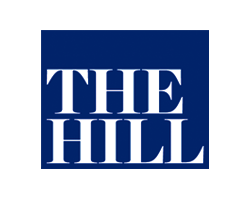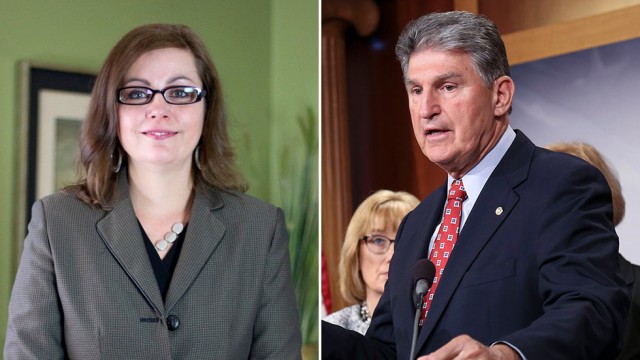West Virginia Senator Joe Manchin Faces Primary Challenge From the Left

By Ben Kamisar
June 20, 2017 - Paula Jean Swearengin is no stranger to taking on West Virginia Sen. Joe Manchin (D).
She confronted the senator during a March town hall in South Charleston, asking Manchin what the state’s “Plan B” is for its economy when coal is gone.
“We are tired of being collateral damage,” Swearengin said as a small group of supporters behind her cheered and clapped.
Manchin pointed to funding provided by the Abandoned Mine Lands program, telling Swearengin “we’ll have to agree to disagree” on the role of coal before moving on to the next question.
But Swearengin didn’t move on. Instead, the exchange with Manchin helped convince her to run a primary bid to replace him in 2018.
“Joe Manchin has been our secretary of state, he’s been our governor and he’s been our senator. And through his long terms, we have not seen any type of economic development,” Swearengin told The Hill in an interview.
“I’ve done everything imaginable as a mother and a coal miner’s daughter to create a brighter future for our children, and it fell on deaf ears.”
Swearengin, a 43-year-old West Virginia native and accounting clerk, comes from a family with a history in the mining industry. Black lung killed her grandfather, while a handful of family members have the disease as well.
After channeling her frustration with the coal industry into local activism, Swearengin — a supporter of Sen. Bernie Sanders’s (I-Vt.) Democratic presidential bid — decided to mount a long-shot bid for Senate against Manchin.
Swearengin is backed by a number of new progressive groups, including Brand New Congress. The group is the brainchild of a handful of former Sanders presidential staffers and volunteers who want just that: to replace “almost all of Congress in one fell swoop.”
As a Brand New Congress candidate, Swearengin has agreed to a platform that includes
single-payer healthcare, trillions of dollars of investment into infrastructure and industry, and a plan for an economy based on renewable energy.
The plan might gel with the national progressive playbook, but such a liberal platform could be a tough sell in rightward-shifting West Virginia.
Democrats still hold a significant voter registration edge in West Virginia, but many of those Democrats have viewpoints and voting histories that resemble Republicans’.
Trump won the state by 42 points in 2016, one major reason why Manchin is a top Republican target in 2018.
GOP Rep. Evan Jenkins has already announced a bid against Manchin, and Attorney General Patrick Morrisey is expected to run, too. Either could be a formidable challenge to Manchin.
Manchin has regularly managed to win office as a Democrat despite the state’s right turn thanks to a coalition of supporters who wouldn’t stand behind most Democrats.
Manchin is anti-abortion, once held an “A” rating from the National Rifle Association and has accused the Environmental Protection Agency of pushing overly burdensome regulations.
That background has frustrated liberals who see him as a Democrat in name only. Manchin’s occasional praise for Trump and his willingness to support most of Trump’s Cabinet nominees have only made that worse.
The progressive Credo Action collected more than 200,000 signatures on a petition to remove Manchin from Democratic leadership, and progressive groups bristled at a report that said he reached out to Breitbart News.
Manchin’s response: a challenge to his Democratic opponents to primary him.
Despite those criticisms, Manchin has also kept one foot on the left — he pushed for strengthening background check requirements for gun purchases in 2013, and this year he voted against a measure that let states bar some funding to abortion providers.
Manchin allies and some political analysts believe Manchin’s moderate brand makes him a unique Democratic fit in the state.
While Sanders won West Virginia’s Democratic primary, 55 percent of Democratic voters who participated in primary exit polling called themselves moderate or conservative.
“He’s been able to win in West Virginia by stitching together a pretty impressive coalition of Democrats, independents and some Republicans,” said Doug Thornell, a Democratic strategist and former aide to the Democratic Senatorial Campaign Committee.
“He knows the state probably better than anyone.”
Manchin’s unique brand makes him “incredibly valuable to the Democratic Party,” according to FiveThirtyEight’s Harry Enten, who used statistics to show that a successful primary challenge would effectively guarantee Democrats lose the seat.
But Swearengin and other progressives don’t believe the conventional wisdom that only Manchin can win the seat for Democrats — they argue that Democrats have lost their way in the state because they are running too close to Republicans.
“The Democratic Party has failed us, because we haven’t run the progressive platform we’ve been promised. … That’s why people have moved their votes to the Republicans,” she said.
“Bernie Sanders won the primaries because he offered promise, offered hope, offered solutions. The reason that Donald Trump won is because he offered promise, hope and solutions, but that’s not happening.”
It’s unclear whether Swearengin’s primary challenge will gain traction, especially without access to the kinds of dollars needed to topple an incumbent.
With 10 Democratic Senate incumbents up for reelection in states carried by Trump, the party will likely spare little expense in defending its incumbents, including Manchin. That’s especially true since Manchin is a member of Senate Democratic leadership.
Without a clear path toward a major funding source, Swearengin is trying to highlight her differences with Manchin on coal.
She charges that Manchin and other state leaders have not diversified the state’s economy beyond coal. While she didn’t call for a freeze of new coal-fired power plants, she argued that coal’s future in the state should include far more regulation and commitment to sustainability.
While Swearengin noted Manchin’s leadership on the Miners Protection Act (MPA), which funded healthcare benefits for many retired miners, she said that the deal makes “no promises for the future generation of coal miners.”
Manchin will undoubtedly tout his role in the MPA, a major victory that touches all aspects of the mining industry. And he’s expected to counter charges about his work for the state’s economic development by pointing to his support of the Export-Import Bank, which has provided state small businesses with more than $100 million in loans, as well as various measures aimed at helping miners.
But while Democrats believe Manchin is firmly in the driver’s seat, they say nothing can be ruled out in this political climate.
“He absolutely can’t ignore progressives in the state. He’ll have to figure out how to make them comfortable voting for him in the primary and turn out in droves for him in the general,” Thornell said.
“Joe Manchin is a very well-known brand in the state, and West Virginia Democrats know that they can count on him, but you can’t take anything for granted.”

Paula Jean Swearengin and Joe Manchin

